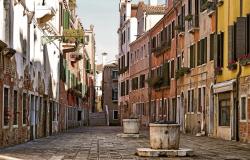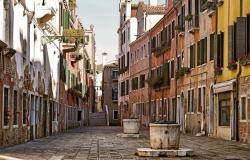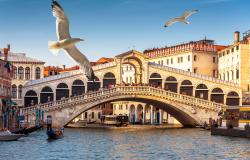 A new generation of Italian falconers are set to fan out across the country, launching their winged charges to protect the nation's
A new generation of Italian falconers are set to fan out across the country, launching their winged charges to protect the nation's
monuments.
An Ornithological Museum at Marostica near Venice has set up Europe's first professional school in the ancient art, which can be traced back through the medieval nobility to the time of the Egyptian Pharaohs and even Mesopotamia.
The academy will tomorrow issue European Union-recognised diplomas in falconry, enabling 23 graduates from all over Italy to look for work protecting city centres and artistic sites from pesky intruders like pigeons.
Already, three falcons are on duty at the ancient Roman city of Herculaneum near Pompeii, where pigeon droppings are eating away at the site's unique fabric. "Falcons are the only birds of prey which have proved
effective in scaring off other birds," said academy chief Salvatore Foglio.
"I'd like to stress that falconry has from its inception been against bloodshed. The falcon's presence alone is enough to send other species flying. At the time of Crusades, furthermore, the gift of a falcon marked an armistice between Christians and Saracens," Foglio said.
The director, who set up his school with the help of funding from the Veneto region, also stressed the female side of the occupation.
"It's the female bird that does the business. She's more than two times the size of the male."
Of the 23 new graduates, he added, seven are women. "It's not a guy thing at all," Foglio said. "Women have more of an innate knack for taming the animal."
One of the seven women falconers, Lisa Causin, said: "At the start of the course I was really more interested in getting to know the world of falconry."
"But then I became passionate about it and realised I could turn that passion into a paying job," she said.
Causin, 28, will become the owner of her falcon in April and will then start looking for work. She hopes to find a job re-introducing birds of prey into the wild.
But the falcons' main area of activity is driving away unwanted birds including seagulls who infest refuse dumps and a number of species responsible for 'bird strike' at airports - when they get sucked into plane's engines and can even cause crashes.
Other systems such as broadcasting ultrasound waves have been tried - but the trusty old falcon has proved the only reliable deterrent. Foglio said the academy had already selected another 25 candidates for next year's course, after receiving more than 500 applications.
"Given that it is an EU-sanctioned programme we'll also be looking to expand our intake to other countries," Foglio said.
That way, he said, Italy would reassert its position of state-of-the-art leader - a status enjoyed since the time of legendary Holy Roman Emperor Frederick II, author of a famous treatise on falconry.









